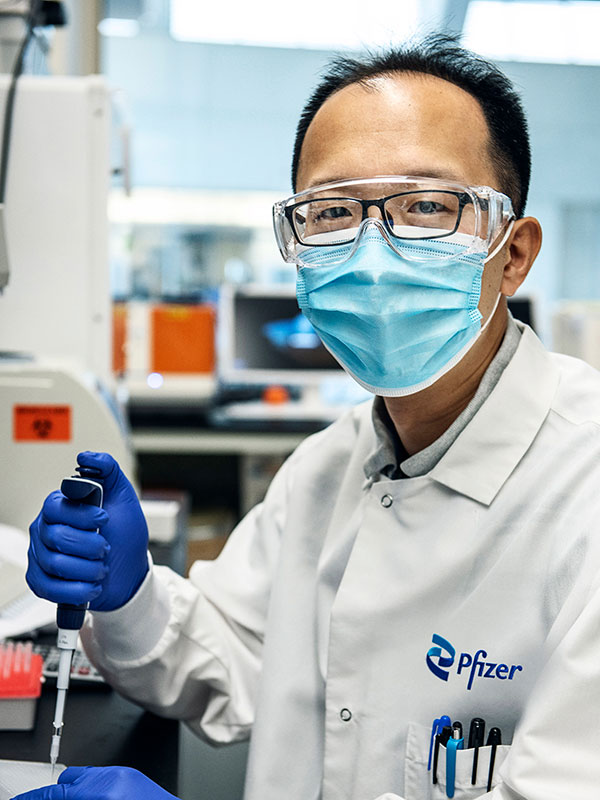Climate Action
There are significant risks posed to society by climate change, including increased negative impacts on human health, frequency of severe weather events, and the potential disruption of supply chains essential to provide medicines and vaccines to patients.
Pfizer is committed to
- continue our efforts to drive down GHG emissions throughout our Value Chain pursuing ambitious targets aligned with a 1.5°C pathway
- conduct robust risk assessments to safeguard resiliency of our research, manufacturing, and commercial activities;
- transparently report on our progress, risks, and opportunities aligned with Task Force of Climate-related Financial Disclosures;
- establish criteria to demonstrate meaningful environmental performance and improvement across the manufacturing lifecycle of our medicines and vaccines;
- engage with stakeholders to explore markets for environmentally preferable products; and
- work through global trade associations to encourage reduction of GHG emissions voluntarily and, through support of regulations that use market-based approaches, achieve reductions aligned with scientific consensus of the IPCC and the Paris Agreement.
To learn more, see Pfizer’s Climate Change Position Statement.
Our Climate Ambitions: to become Net Zero
We have demonstrated our commitment to climate action through our history of greenhouse gas (GHG) emission reductions, with our first formal GHG goal set in 2001. Through successive goal periods, we reduced our GHG emissions by more than 60 percent over the period 2001 to 2020.
As one of the first companies to receive validation of our GHG reduction goal by the Science Based Target Initiative in 2015, Pfizer remains committed to ambitious long-term actions. Our drive to effect positive change is demonstrated through our ambition to achieve the Net-Zero Standard.
Achieve Net-Zero Standard by 2040
We aim to reduce our company (Scope 1 & 2) emissions by 46% by 2030 compared to a 2019 baseline; as an interim milestone to reduce our company emissions by 95% by 2040.
Recognizing that value chain (Scope 3) emissions account for approximately 80 percent of our Greenhouse Gas footprint, we aim to reduce value chain emission by 90% by 2040. As a near term target toward this longer-term goal, by 2025 we aim for 64 percent of our purchased goods and services suppliers by spend to set their own science-based GHG reduction targets. We also aim to reduce emissions, from a 2019 baseline, for upstream logistics by 10 percent and business travel by 25 percent.
Our Sustainability Bond
In March 2020, Pfizer launched a $1.25 billion “Sustainability Bond”, the first to be issued by a biopharmaceutical company. Proceeds from the bond will help manage our environmental impact, strengthen healthcare systems and manage our social impact, by supporting increased patient access to Pfizer’s medicines and vaccines, especially among underserved populations.
Sustainalytics, a leading global provider of environmental, social, and corporate governance research and ratings, issued an opinion in March 2020 that the Pfizer Sustainability Bond Framework was credible, impactful, and aligned with the four core components of the Green Bond Principles 2018 (GBP 2018 ) and Social Bond Principles 2018 (SBP 2018).
Pfizer’s Sustainability Bond framework of eligible investments is aligned with the International Capital Market Association Sustainability Bond Guidelines 2018. Net Proceeds from our Sustainability Bond issuance have been allocated to environmental projects supporting green design and construction of new office and manufacturing facilities.
In 2021, we launched a $1 billion sustainability bond that will help fund Covid-19 vaccine expenses.
Sustainable Medicines
We are pursuing ways to reduce the environmental impact of our medicines throughout the product life cycle, addressing areas such as greenhouse gas (GHG) emissions, water scarcity and discharge, and elimination of substances of environmental concern. We pursue conservation of resources towards a circular economy and integration of green chemistry/biotechnology principles throughout our process lifecycles. By working to develop sustainable medicines criteria, we aim to demonstrate the social and environmental value of our products and to set targeted goals to facilitate improvement, transparency, and accountability.
- Waste
Pfizer takes a multi-faceted approach by focusing on source reduction, waste minimization, and recycling improvements.
- Water Stewardship
The availability of clean water is a basic human need requiring management at the local watershed level. We remain committed to conserving resources and reducing water withdrawal, particularly in water-stressed areas. We have evaluated our practices and are focused on being effective stewards by implementing water stewardship plans and responsibly managing water discharges from manufacturing processes. To learn more, see:
- Packaging
We're collaborating across our supply chain to reduce the environmental footprint from our packaging.
- Green Processes
We’re continuously working to discover innovations that will minimize our impact on the environment.
- Making a Greener Workplace
We recognize that every commercial office, manufacturing site, logistics center, and R&D facility has an impact on the environment.
- Preserving Our Natural Resources
We’re restoring land, preserving wildlife, and helping to conserve natural resources.
- Pharmaceuticals in the Environment
Pharmaceuticals have become chemicals of emerging concern to the public because of their potential to reach drinking water.
Performance Metrics
View Performance Metrics and learn how Pfizer’s initiatives are making a difference.

Our Responsibility
Our unique resources allow us to do more for people. Using our global presence and scale, we’re able to make a difference in local communities and the world around us.











